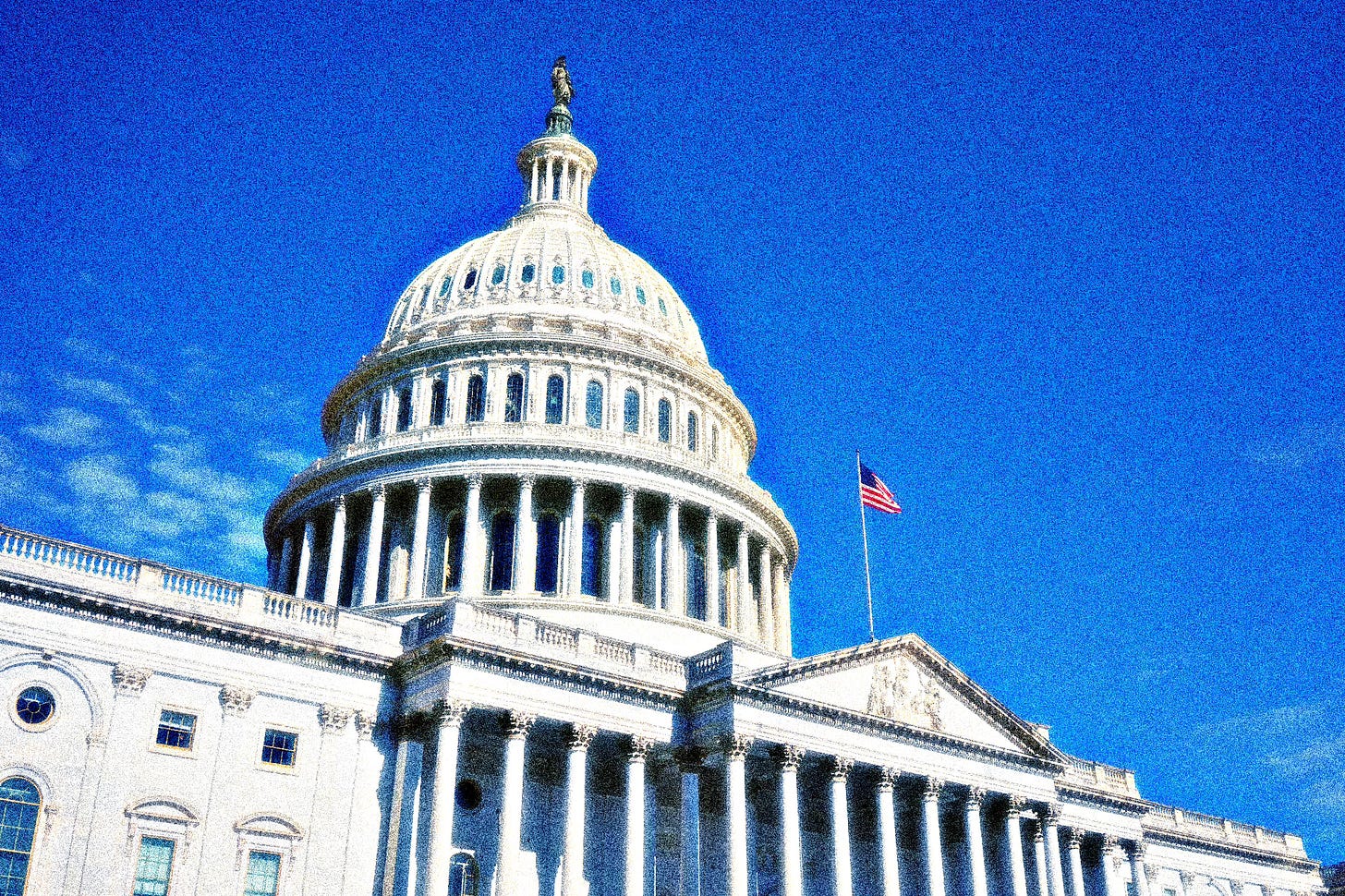The Judiciary Will Become Virtually Powerless in Protecting Your Rights if the Current Budget Bill Becomes Law
Senate Republicans have proposed an even worse version of a House provision that will require citizens suing the government to post enormous sums in bonds
Like a well-armed drone flying beneath the radar, the latest assault on the independent judiciary is dangerous and stealthy. A short and easily overlooked passage in Section 70302 of the behemoth budget reconciliation bill, it created hardly a ripple of attention as it passed in the House of Representatives and awaited action in the Senate.
In the past few days, however, the Senate rewrote the provision in a way that arguably makes it worse. The House version sought to severely undermine the court’s ability to enforce its judgments by finding government officials in contempt—but the new Senate replacement could make it all but impossible to obtain a preliminary injunction or restraining order against the government in the first place.
The House’s Attack on Judicial Authority
In the original House version, a single sentence buried in a roughly 1,100-page bill, would have conditioned a court’s exercise of its contempt power on requiring a bond any time a party seeks an injunction. Rule 65(c) of the Federal Rules of Civil Procedure already provides for a bond as security for injunctions. The purpose of the bond is to compensate the party being sued for any losses it incurs if it follows the injunction but eventually wins the case on its merits. Yet in cases involving constitutional rights or limits, the government (at least until recently) rarely sought such a bond. For good reason: It is a hallmark of American exceptionalism that we fight our battles in the courts rather than the streets, so the courts wanted to ensure access for citizens to defend their basic rights in the courts.
The judicial contempt power allows courts to impose civil fines or criminal penalties on entities or officials who disregard their orders. This basic power of the courts traces back to the 14th century in England. It was specifically authorized in the first session of the U.S. Congress in the Judiciary Act of 1789.
Judges rarely have to resort to contempt, given that most public officials (and private parties, for that matter) obey court orders. But this power is essential if the judiciary is to perform its crucial role, set forth in The Federalist No. 78 and Marbury v. Madison, to hold the more powerful political branches to the boundaries of their constitutional authority.
And yet this proposed House provision was relatively easy to evade. Courts could have minimized the impact by ordering bonds to be posted in a nominal amount, say, a single dollar. But the threat was not ephemeral. In an ongoing case challenging grant cancellations, the Trump administration reportedly asked the judge to require a bond for the entire amount of the grants. Likewise, conservative challenges to President Obama’s DACA executive order, to President Biden’s student loan forgiveness order, or to Covid orders could have faced insurmountable financial obstacles had courts ordered bonds for the entire amount of the economic consequences, in some cases totaling in the billions. No plaintiff, much less a nonprofit law firm, could come up with the sums required.
Protecting the Government Instead of Citizens
The Senate could have merely stripped this provision under the so-called Byrd rule, which excludes “extraneous” matters from budget bills.
Instead, the Senate bill substituted a new version. This time, it does not focus on the contempt power but instead targets temporary restraining orders and preliminary injunctions. These are rulings that demand that the government halt the enforcement or implementation of a policy immediately, pending the final outcome of the case, if the judge concludes that it is likely the plaintiffs will prevail against the government in the end.
Just imagine, for instance, that during Covid, courts could not stop executive orders closing down houses of worship unless millions of dollars were posted in bonds. Or an executive order confiscating guns. The basic idea of a temporary restraining order or preliminary injunction is to prevent the damage to the rights and well-being of citizens from the government carrying out an action or policy that is likely to be found illegal or unconstitutional.
The new Senate version turns that logic on its head, instead seeking to protect the government from any costs that might be incurred from citizens asserting their rights.
This new version no longer tries to take away the power to enforce rulings through contempt. Nor does it apply retroactively, which could have caused chaos and brought settlements in many old cases into doubt. But it imposes a requirement that plaintiffs suing the federal government post a bond “in an amount proper to pay the costs and damages sustained by the Federal Government.” Crucially, “No court may consider any factor other than the value of the costs and damages sustained.” That could mean that they can’t consider the potential damage to the plaintiffs from the government’s actions, nor can they consider the plaintiffs’ ability to pay.
Requiring potentially massive bonds to enjoin government action could prevent many or even most such lawsuits from being filed in the first place, because few would have the means to pay upfront. That is especially true in cases involving sweeping policies where the government could claim “costs” in the billions. Only state governments could conceivably post bonds in that amount, though they would also balk at the potential hit to their budgets.
This means that many parties would have no choice but accept violations of their rights rather than seek legal redress, severely undermining the Constitution.
This provision is no doubt inspired by the so-called nationwide injunctions issued against many of the current administration’s actions. That issue has evoked numerous reform proposals and may soon be addressed by the U.S. Supreme Court. This proposal sweeps the “problem” away by largely rendering preliminary injunctions against an administration impossible, truly throwing the baby out with the bathwater. If you are certain that your “side” will forever be in power, and will do no constitutional wrong, maybe this is a good idea. But it removes recourse against excesses by executive officials, both Democrat and Republican.
Not the Only Effort to Neuter the Courts
This provision is one small part of a greater effort to neuter and neutralize the federal courts, an effort that includes bills of impeachment over objectionable court rulings and threats of defiance of judicial orders and of suspending the writ of habeas corpus. The point of such efforts, according to Mike Davis, architect of a project called Article III, is to hold the “Sword of Damocles over the judiciary's head,” which requires that “you need to go after this on multiple fronts."
In The Federalist No. 78, Alexander Hamilton prophesied that the judiciary would always be the weakest of the three branches of government for it possesses “neither FORCE nor WILL, but merely judgment.” Yet its authority “to declare all acts contrary to the manifest tenor of the Constitution” was vital to the protection of individual rights. This prevention would limit one of its few tools to enforce such authority.
Either limiting the courts’ contempt power or creating new financial obstacles to enforcing constitutional boundaries will greatly damage our constitutional republic. Preserving our freedom for posterity requires not only eternal vigilance, but alertness to threats that arise in unexpected places.
Clint Bolick is a justice on the Arizona Supreme Court. He does not take a position on the views expressed elsewhere on this website.
© The UnPopulist, 2025
Follow us on Bluesky, Threads, YouTube, TikTok, Facebook, Instagram, and X.
We welcome your reactions and replies. Please adhere to our comments policy.







Thank you for the excellent analysis and material for nightmares for years to come.
To restate the obvious this turns the entire Constitution on its head. Protecting the government from the people was not on the drawing board of the founders and certainly not why the Bill of Rights was amended to it.
There was a time I would have believed the Supreme Court would overturn such a draconian measure, and I hope they still would, but I no longer am confident of that.
This is decidedly Not A Good Thing™.